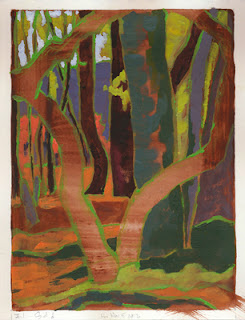Postmodem (sorry) for my first online class
I wanted to write down every detail of my recently completed online class, to enrich the world with a scrap more info about what distance learning is really like, but I'll have to settle for a foggy overview. As I so often do.
I'm no stranger to learning things online, but it's usually through my own motility, not guided by a syllabus with a professor behind it. So I did find myself chafing a bit whenever I noticed that I lacked complete independence and discretion, more so than I would in a face to face class. However, I really appreciated the amount of student input into the discussion. I had never heard everyone's completely formed thoughts in this way, and really appreciated the weekly writing of other students.
The class was “Writing Theories in Second Language Instruction”, taught by Katherine Kiss through the UMASS Boston online masters in Applied Linguistics program. I'm not sure I feel better equipped to teach writing as a creative and useful endeavor than I was before, but I am certainly more aware of the issues of second language writing, and have a couple of lesson tricks up my sleeve if backed into a teacher's corner. And I did an impressive amount of reading and writing, myself. Meaning I impressed myself with the amount of reading and writing I did...
The biggest surprise to me, content wise, was the degree to which first language literacy affects literacy in the second language. I would have thought that the genius human mind could equally well learn writing in any language it could speak (if the mind had lips... and lungs... and a larynx... never mind). This may be true in some ways, but the efficacy of the learning is tremendously greater if the student is first brought to literacy in the first language. For example, if you have a group of students for four months who need to improve or begin their literacy in any language, and you take half of the group (call them Group A) to study the second language, and half of the group (Group B) to first study the native language for two months, and then follow with the second language, Group B will end up outperforming Group A. Interesting, right? (Read more about this in Cheryl A. Roberts' article: http://www.ncela.gwu.edu/files/rcd/BE019750/Transferring_Literacy.pdf )
So, thinking about the importance of the first language on second language writing development, I decided to try starting aliteracy group for immigrant Haitian Americans. I'm calling it the HCLP – the Haitian Creole Literacy Project. Here's a blurb I wrote about it:
Anyway, I said we were “theoretically” meeting there, because I have yet to find students, at least that can come to this location. Not surprisingly, illiterate students don't read flyers and emails, and I am reluctant to make announcements in any of the local churches that have mass in Kreyòl, due, see catholic school reference above, to my fear of christians. Yeah, so this sounds like it will be successful, right? We'll see.
I'm no stranger to learning things online, but it's usually through my own motility, not guided by a syllabus with a professor behind it. So I did find myself chafing a bit whenever I noticed that I lacked complete independence and discretion, more so than I would in a face to face class. However, I really appreciated the amount of student input into the discussion. I had never heard everyone's completely formed thoughts in this way, and really appreciated the weekly writing of other students.
The class was “Writing Theories in Second Language Instruction”, taught by Katherine Kiss through the UMASS Boston online masters in Applied Linguistics program. I'm not sure I feel better equipped to teach writing as a creative and useful endeavor than I was before, but I am certainly more aware of the issues of second language writing, and have a couple of lesson tricks up my sleeve if backed into a teacher's corner. And I did an impressive amount of reading and writing, myself. Meaning I impressed myself with the amount of reading and writing I did...
The biggest surprise to me, content wise, was the degree to which first language literacy affects literacy in the second language. I would have thought that the genius human mind could equally well learn writing in any language it could speak (if the mind had lips... and lungs... and a larynx... never mind). This may be true in some ways, but the efficacy of the learning is tremendously greater if the student is first brought to literacy in the first language. For example, if you have a group of students for four months who need to improve or begin their literacy in any language, and you take half of the group (call them Group A) to study the second language, and half of the group (Group B) to first study the native language for two months, and then follow with the second language, Group B will end up outperforming Group A. Interesting, right? (Read more about this in Cheryl A. Roberts' article: http://www.ncela.gwu.edu/files/rcd/BE019750/Transferring_Literacy.pdf )
So, thinking about the importance of the first language on second language writing development, I decided to try starting aliteracy group for immigrant Haitian Americans. I'm calling it the HCLP – the Haitian Creole Literacy Project. Here's a blurb I wrote about it:
According to the 2002 UNESCO Institute for Statistics, 46.2% of men and 50% of women (defined as over the age of 15) are not literate in Haiti. In addition, while only 10% of Haitians are bilingual in French and Kreyol, (http://www.cal.org/co/haiti/hlang.html) almost all school instruction is in French. Therefore, as an ESOL teacher interested in learning Kreyòl, and fluent in French, I hoped to create a trilingual literacy group in Providence, focusing on writing down personal stories, children's stories, and personal introductions, in each of these three relevant languages.The HCLP is, theoretically, meeting every Thursday from 5 to 7 pm, in the picture room downstairs at the William Hall Library, in a room so ancient that it doesn't have electrical outlets. It does, wonderfully, have two large windows. Yay! And a wall of dark, metallic, flat files. And local history photos gussied up 30 plus years ago for various displays. All in all, it kind of feels like my old catholic grade school. It's kind of comforting, in that way, because the school library was always my refuge as a kid.
Anyway, I said we were “theoretically” meeting there, because I have yet to find students, at least that can come to this location. Not surprisingly, illiterate students don't read flyers and emails, and I am reluctant to make announcements in any of the local churches that have mass in Kreyòl, due, see catholic school reference above, to my fear of christians. Yeah, so this sounds like it will be successful, right? We'll see.



Comments
Post a Comment